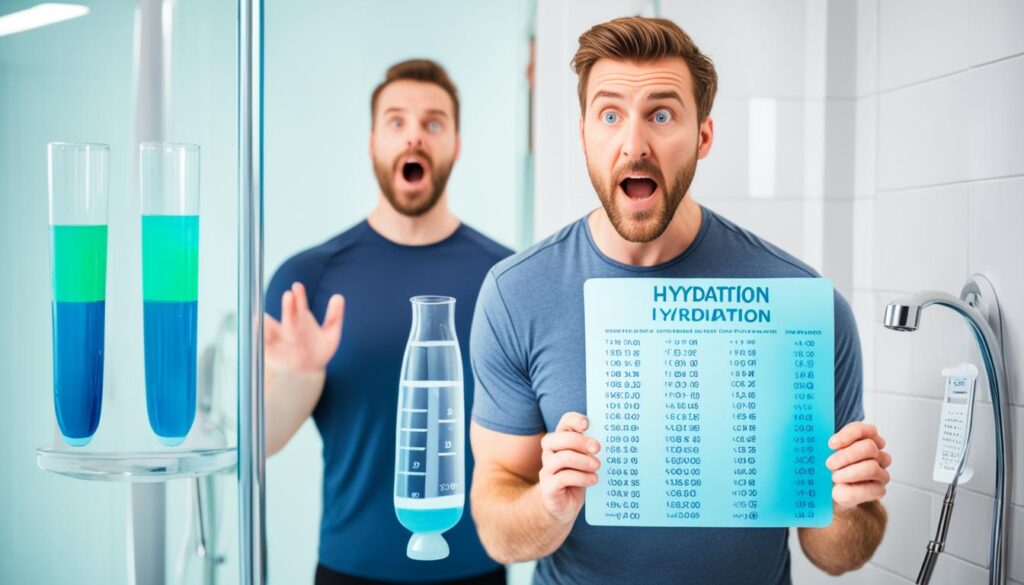In the search for weight loss secrets, many in America wonder, “Can a water diet lead to weight loss?” This method, called the water diet, means drinking only water for a certain time, skipping solid food. While some believe the water diet can help lose weight, it’s important to carefully consider and seek expert advice.
Going on a water diet is not a universal solution, and it’s important to know the details. Getting ready, understanding the risks, and knowing how to start eating food again after the fast are crucial. This helps those looking to lose weight through fasting focused on drinking water.
Key Takeaways
- Water diets involve not eating solid food, just drinking water to lose weight.
- Always talk to a healthcare professional before starting a water diet to make sure it’s safe for you.
- Being well-prepared and properly starting to eat food again are key to avoid health problems.
- Intermittent fasting could be a safer, more balanced way to lose weight than long water diets.
- Knowing your health and potential risks is important for safely following a water diet.
- People’s experiences with water diets differ, showing the need for a personalized fasting plan.
Understanding Water Fasting: An Overview of Benefits and Risks
Water fasting isn’t new. It comes from old traditions that aimed to cleanse the body and mind. Today, many talk about the benefits of water diet for health. Yet, it’s vital to approach it carefully, keeping in mind the health considerations of water fasting.
Defining Water Fasting and Its Historical Significance
A water fast means you only drink water, no food. This practice was common in many cultures for spiritual growth. Fasting helped people go beyond their physical needs to reach a higher spiritual awareness.
The Science Behind Water Fasting and Weight Loss
Nowadays, people are interested in water fasting for weight loss. The secret? Autophagy – our body’s way of cleaning out damaged cells. This process, started by fasting, is key for health and longevity. It’s why the water fast is popular among those focusing on a healthy life.
Health Considerations and Contraindications of Water Diets
Water fasting looks simple but isn’t for everyone. It can be risky for people with certain health issues, like heart problems or diabetes. Always talk to a healthcare provider before starting. They can help avoid any negative effects on your health.
| Consideration | Benefits of Water Diet | Risks |
|---|---|---|
| Autophagy Activation | Potential for improved cellular health and longevity | May lead to overextended fasting periods without proper guidance |
| Weight Management | May contribute to temporary weight reduction | Possibility of muscle loss and nutrient deficiency |
| Mental Clarity | Reported increase in cognitive function post-fast | Can induce headaches, dizziness during transition |
| Safety and Suitability | Customizable to individual needs with professional advice | Contraindicated in many health conditions |
Can Water Diet Help Lose Weight: Investigating the Weight Loss Effectiveness

The water cleanse for weight loss idea is based on the body using its fat for energy when there’s no food. This is due to a process called ketosis. On a water diet plan, the body starts using fat instead of glucose for energy. The liver then makes ketones for the brain. Experts warn, though, that you must find a balance between losing weight and eating well after the diet.
So, does drinking water help you lose weight? Studies show water fasting can really reduce body weight and fat. But, fast weight loss might mean losing muscle too. This is not good for those who want to look lean. Doctors say it’s important to eat nutritious foods after fasting. This helps keep muscle while still losing fat.
Key Considerations for a Water Cleanse:
- Ketosis can lead to fat loss, but you should also think about keeping muscle.
- The success of a water diet plan depends on what you eat afterward.
- Experts say eating well is key to keep up the health and weight loss benefits.
Talking to a doctor before starting a water cleanse is wise. They can help make a plan that fits your health needs and goals.
Navigating the Water Diet: Practical Tips and How-To Guide
Starting a water diet is more than making a simple choice. It involves planning and understanding the necessary steps. This makes the diet both effective and safe. Preparing for it doesn’t happen quickly. Getting ready is key to your success.
Preparing for Water Diet: Steps to Take Before Starting
Before starting a water diet, it’s best to talk to a doctor, especially if you have health issues. Reducing your meal sizes gradually can make it easier for your body to adapt. This prepares you for a smooth start on the water diet for weight loss.
Recommended Water Intake During Fasting
Staying hydrated is crucial during your water diet. Usually, drinking 2 to 3 liters of water daily is advised. This keeps your body’s fluids balanced. It also helps with detoxification and keeps your body’s functions running smoothly.
Transitioning Back to Normal Eating Post-Fast
When your water fast ends, reintroduce food slowly. Start with small portions of nutritious food. Gradually, you can eat larger portions. This approach prevents any problems from eating too much, too fast. It also helps you keep the weight off.
| Phase | Actions | Objectives |
|---|---|---|
| Preparation | Consult healthcare provider Reduce meal sizes |
Ensure readiness Gently adjust the body |
| During Fast | Consume 2-3 liters of water Monitor wellbeing |
Maintain hydration Support detoxification |
| Post-Fast | Gradually reintroduce food Increase meal size as tolerated |
Avoid refeeding syndrome Sustain weight loss |
Intermittent Fasting Vs. Extended Water Diets: Finding the Right Balance
Finding the best fasting method is key for those wanting to get health benefits. Intermittent fasting and extended water diets both offer great health boosts. But, they work best for different people and experience levels.
Exploring Shorter-Term Intermittent Fasting for Beginners
Beginners might find shorter-term intermittent fasting, like the 16/8 method, easy to start with. This means you fast for 16 hours and then eat during an 8-hour period. Intermittent fasting has many benefits, such as better insulin sensitivity and heart health.
Comparing Benefits of Intermittent Fasting and Extended Water Diets
Choosing between intermittent fasting and extended water diets needs careful thought. Extended water fasting, from a day to several days, might boost the fasting benefits. This includes cleaning the cells and aiding in preventing diseases. Still, water fasting’s benefits come with risks like nutrient deficits and the need for medical check-ups, especially for longer fasts.
Experts agree that tailoring the fasting plan to each person is crucial. Consider your health, dietary likes, and your daily life. Eating nutrient-rich food when not fasting helps in getting the needed nutrients for good health.
Choosing the right fasting technique needs thought, planning, and maybe advice from a healthcare pro. This helps avoid risks and ensure health gains.

Water Diet Results: Real People, Real Stories
The water diet for weight loss journey is full of varied experiences. People share inspiring and cautionary tales. These stories offer motivation and advice for anyone thinking of trying this diet.
Many share stories of success and occasional setbacks in weight loss. For those who lost weight, the benefits went beyond the scale. They enjoyed better health, more energy, and clearer thinking.
“You never know how strong you are until you look back at the journey you’ve undertaken. Water fasting is no different—it’s more than a diet, it’s a mental and physical cleanse,” shares a 30-year-old dieter who saw significant results.
However, not everyone’s experience is the same. Some faced challenges like tiredness, strange body reactions, and struggling willpower. These stories underline the need for tailored plans and medical advice.
| Weight Loss Experiences | Results | Challenges |
|---|---|---|
| Individual A’s Story | 15-pound weight loss | Fatigue and dizziness |
| Individual B’s Journey | Increased metabolic markers | Dry skin and cravings |
| Individual C’s Process | Improved energy levels | Muscle loss |
Considering a water diet for weight loss can bring great change. It’s vital to start with good knowledge, true motivation, and realistic goals. Getting advice from a doctor makes the journey safer and more likely to succeed.
- Consult with a healthcare provider.
- Understand your body’s cues.
- Customize the approach to suit personal health needs.
These real-life stories highlight the value of knowledge and a balanced approach to the water diet.
Debunking Myths: The Truth About Water Diet and Metabolism
Exploring water diet myths means tackling common wrong beliefs about water fasting metabolism effects. To clarify, water fasting might increase metabolism briefly, thanks to adrenaline. Yet, the long-term effects on metabolism are still debated. We’ll look into what’s myth versus fact about its impact on your metabolic rate.
Some people think fasting with water slows down metabolism. But, eating right after fasting can help keep your metabolism steady. Getting the right nutrients is crucial for your metabolism once you start eating normally again. We’ll check some myths and compare them with scientific knowledge below:
| Water Diet Myth | Actual Metabolic Effect | Important Considerations |
|---|---|---|
| Water fasting drastically lowers metabolism. | Potential temporary boost due to stress response. | Metabolic response varies; it’s not universally detrimental. |
| Extended water fasting is always harmful to metabolic health. | Effects depend on duration and individual health. | Consult with health professionals and monitor body’s response. |
| Water fasting leads to permanent metabolic damage. | No conclusive evidence supports permanent damage. | Strategic refeeding and balanced nutrition are key post-fast. |
The table shows that the effect of a water diet on your body can vary a lot. A wise approach, including proper nutrition and lifestyle changes after fasting, can lower the risks. People thinking about trying a water diet should understand that everyone’s body reacts differently to fasting. This awareness can lead to safer, more effective diet choices.
When looking into water fasting metabolism effects, it’s key to talk to health experts. It’s also important not to oversimplify or generalize about water fasting. This will help you avoid unwanted effects.
Staying Safe: Important Precautions and Medical Advice
Starting a water diet for weight loss requires putting safety first. People interested in this method need to prepare well and stay hydrated. It’s key to skip intense workouts to avoid too much strain on the body.
This isn’t an easy path. The effects go beyond short-term dietary changes. So, approach it with care and understanding of its significance.
Seeking a doctor’s advice for water fasting is important, especially for specific groups. The elderly, those with ongoing health issues, and people with complex medication needs must talk to healthcare professionals first. This step helps match the water diet to their health needs, avoiding risks.
Doctors’ supervision during long fasts helps keep track of health and symptoms. This ensures the safety of the person fasting.
Working with medical experts helps customize a safe water diet plan. No matter the length, being careful and consulting healthcare advice is crucial. Following these guidelines supports not just weight loss but a wise, health-focused way of life.




